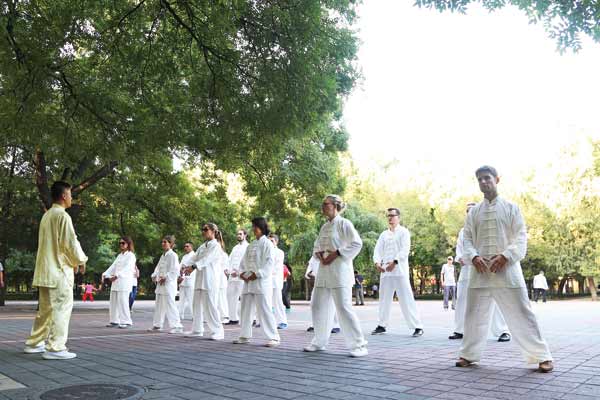Boom in Western business programs designed to inspire China's executives
 |
|
CKGSB China Start program, foreign students experience Tai Chi in China, as a part of their culture studies. [Photo/China Daily] |
In the warmth and tranquility of the Swiss Alps, a group of Chinese tour operators gather for a lesson in innovation and inspiration.
The group is being sponsored by TravelSky Technology, the Beijing-based State-owned travel information provider, to attend an executive business education course hosted by Switzerland's IMD Business School.
The venue is the Chateauform Chalet de Champery, a boutique hotel exemplary of Swiss hospitality that has been especially chosen with the intention of inspiring the tour operators.
But unlike the five-star luxury hotels that are now commonplace in China, Chateauform is characterized by a certain simplicity and unique designs aimed at encouraging interaction.
Guests spend most of their downtime in the lounge, as no television is available in their rooms. Drinks are readily available but no barman is seen, so guests are prompted to serve each other.
Howard Yu, a professor of strategic management and innovation at IMD, who led the lesson, said the goal is not for the Chinese tour operators to copy the model wholesale, but to adopt ways of thinking that they can import back into their businesses.
"A lot of these guys in China are very busy," Yu said. "They constantly look at what their competitors are offering, because they feel they're facing the danger of falling behind. We wanted to show them how Western pioneering companies can get ahead of competition by developing innovative solutions to satisfy customer needs, instead of being copycats."
The Chateauform lesson is just one example of tailor-made China-oriented executive training programs being offered by leading business schools globally.
Once a shrinking market in the years following the financial crisis, executive programs in recent years are experiencing a revival.
China's Cheung Kong Graduate School of Business launched an executive program called China Start. It offers international startup companies the chance to visit leading Chinese incubators and platform businesses, such as the e-commerce platform JD.com, to discuss collaboration opportunities.
Leveraging on its huge alumni network, the business school takes these overseas businesses on the China Start program to meet Chinese investors. Of 10,000 alumni so far, more than half are company chairs or chief executives.
In 2015, the University of Oxford's Said Business School, Harvard Business School and Peking University jointly created an executive degree program to help Chinese family businesses overcome challenges such as succession planning, structural shift and globalization.
"The program's teaching is so well designed and touches the very heart of challenges we face as a family business," said Guo Feng, 34, a second-generation family business owner who participated in the program.









